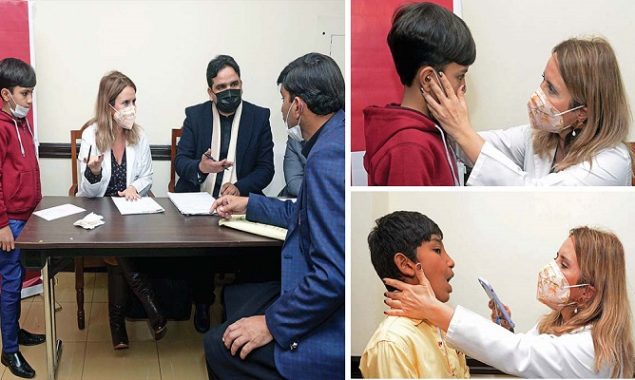Synopsis
Mother of victims shares ordeal, warning others against consanguinity to avoid the inherited blood disorder

Health officials have practically started implementing steps in this regard by inaugurating the bone marrow transplant centre in Rawalpindi on February 23. Image: File
LAHORE: The life of Nasreen Bibi, a 50-year-old widow, completely changed after two of her sons were diagnosed with thalassemia soon after they were born.
“Both my sons Irfan and Nauman, who were twins, were diagnosed with the disease three months after they were born and since then the doctor used to give them injections, around four to six injections every month. This kept on increasing as they kept on growing with the passage of time.”
Nasreen added that in the past month, she lost both her sons within a span of 15 days.
“I used to do household chores and some philanthropists used to help me otherwise it wouldn’t have been possible for me to pay for their medication. I request the government to make the public aware about the issues that may arise from consanguineous marriages, which is one of the major reasons for this disease. Also, screening tests should be made mandatory for the marrying couples to mitigate the chances of this disease.”
Speaking to Bol News, Dr Javeria Mannan, the head of Thalassemia Society of Pakistan, said beta-thalassemia is the most commonly inherited disease in Pakistan.
She maintained that six out of every 100 Pakistanis are carriers of the thalassemia gene. “Surprisingly, these carriers are healthy individuals without any symptoms and are unaware that they are carrying a lethal gene. The tragic story starts when two of these carriers get married to each other.”
Once they get married they have one out of four chances of giving birth to a child with thalassemia major, Dr Mannan added. “After this a heartrending ordeal starts for the parents. These children require a blood transfusion every month of their life from the age of four months to survive. Not only that, the iron overload that they get from blood transfusions has to be removed from their body by means of an injection given to them through a pump — eight hours a day, 20 days a month.”
She shared that thalassemia is an inherited blood disorder and can be simply stated as the inability of the body to produce adequate amounts of haemoglobin in the red blood cells. “The result is severe anaemia.”
Dr Mannan apprised that children suffering from thalassemia require a blood transfusion every two to three weeks of their lives in addition to treatment for iron overload due to the excessive number of transfusions. “Alpha thalassemia is caused by a decrease in production of alpha globin chains due to a deletion or mutation of one or more of the four alpha globin genes located on chromosome 16. Alpha gene mapping can be obtained to determine the specific mutation.”
Bank of donors
Professor Dr Müge Gundoğdu, a Turkish haematologist-oncologist of Memorial Bahçelievler Hospital in Istanbul, has conducted more than 500 successful surgeries of paediatric bone marrow transplants with a success rate of over 90 per cent.
She was recently in Lahore for two days where she checked children suffering from severe diseases such as thalassemia, cancer, haemophilia and sickle-cell anaemia and also shared her experiences with the doctors in Pakistan who are treating children suffering from thalassemia and other blood diseases.
Speaking to Bol News, Dr Gundoğdu said that she met a large number of patients and children who have been diagnosed with thalassemia who could undergo a bone marrow or stem cell transplant within the first five years of diagnosis.
“What your country needs to do is that you should also establish a bank for bone marrow transplants for those patients who do not have donors like Turkey as we have a national bank of bone marrow donors in our country. If we face a shortage of donors, we can also contact Europe to overcome the shortage.”
She shared that it is a fact that there are a large number of thalassemia patients in Pakistan and Turkey due to consanguineous marriages. Dr Gundoğdu advised that the Pakistani government needs to formulate a policy for such marriages along with making it compulsory to go for screening tests.
The data available with Bol News showed that around 12,000 cases of thalassemia, haemophilia and other blood diseases are reported in Pakistan every year and the majority of them need to undergo bone marrow transplants.
Mandating screening
Health officials have practically started implementing steps in this regard by inaugurating the bone marrow transplant centre in Rawalpindi on February 23. President Arif Alvi while addressing the inaugural ceremony had said legislation should be made regarding the thalassemia test of both men and women before their marriages.
“Unfortunately, mass screening at the current stage is not feasible and therefore requires awareness about conducting targeted medical tests as a pre-emptive measure.”
President Alvi maintained that a set of commonly adopted recommendations by the medical community could be more effective and helpful for the government in taking a course on the important matter.
Likewise, Punjab Health Minister Dr Yasmin Rashid on December 14 last year also confirmed that a law on pre-marriage thalassemia test will soon be introduced.
Sources claim that if the government comes up with an effective pre-marriage thalassemia test legislation, and strictly implements it too, then we might be able to mitigate this disease in our country.
Read More News On
Catch all the Pakistan News, Breaking News Event and Latest News Updates on The BOL News
Download The BOL News App to get the Daily News Update & Follow us on Google News.




